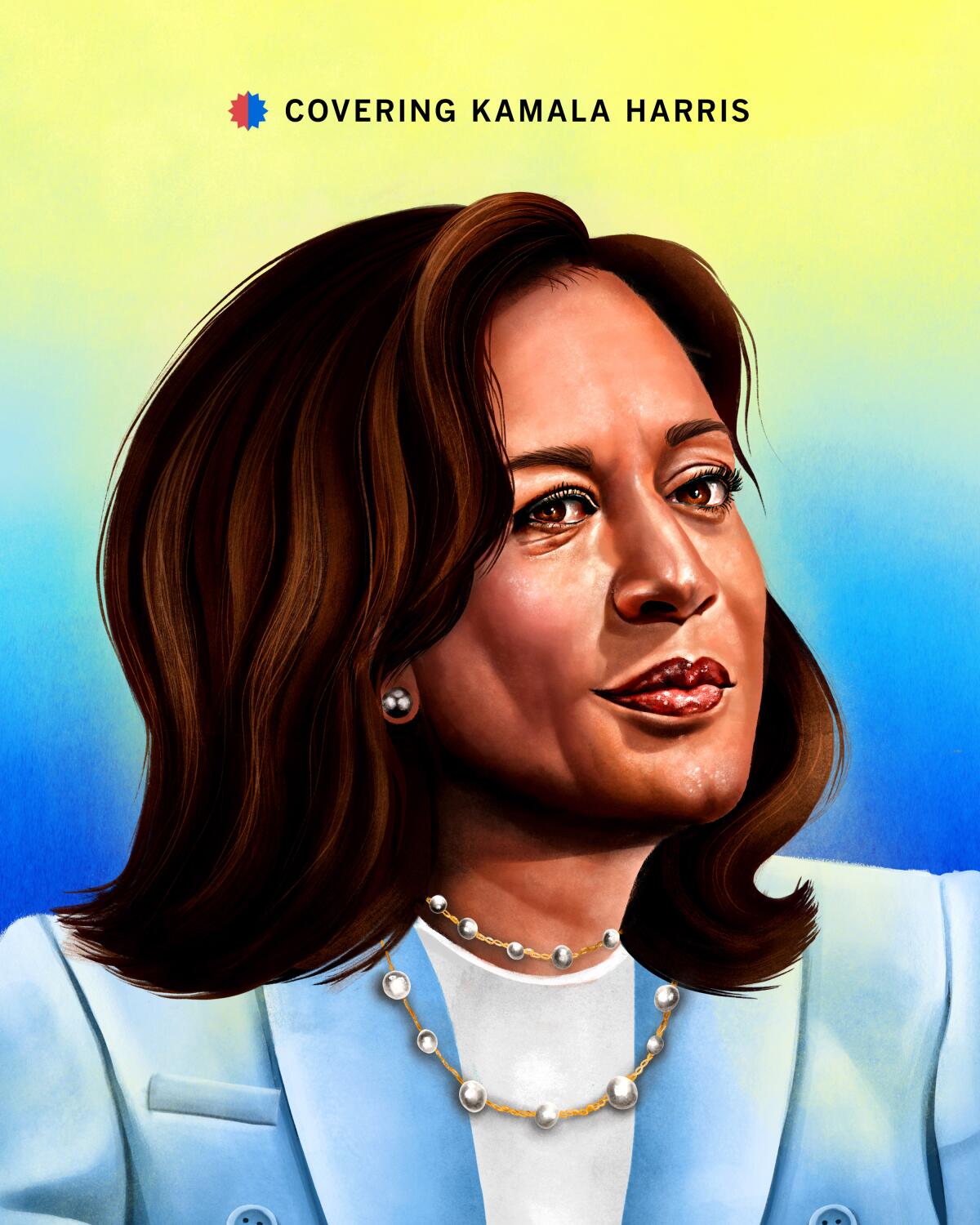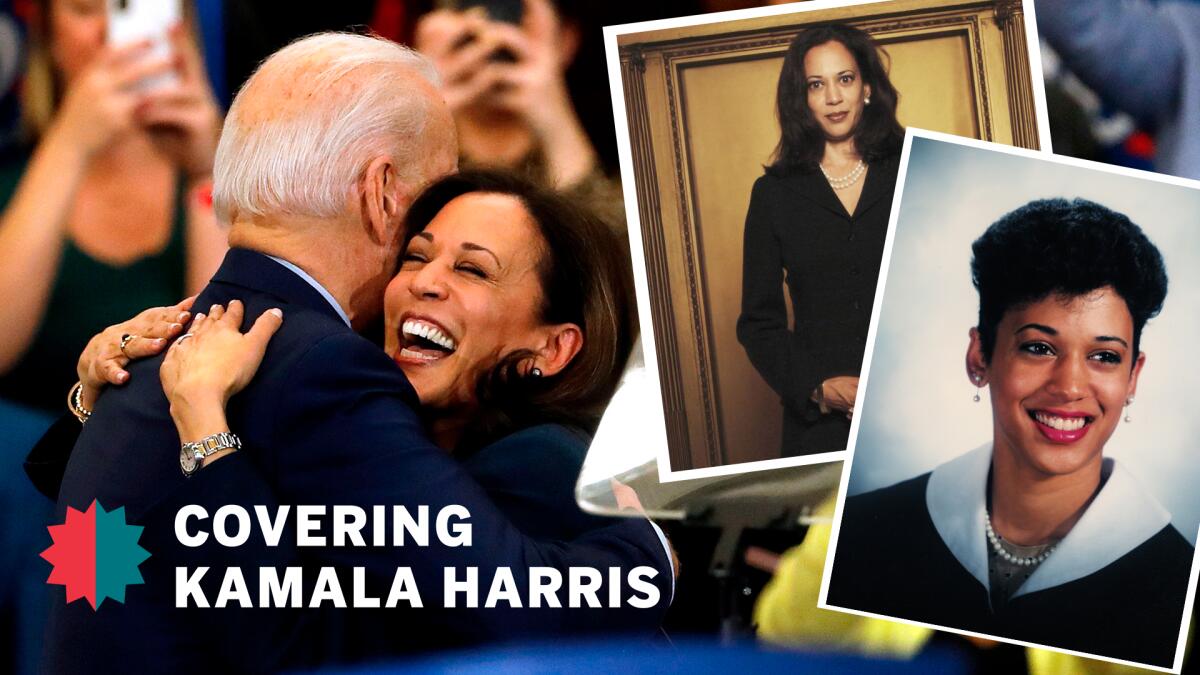Essential Politics: Kamala Harris enters the room
WASHINGTON — Good morning, everyone, and happy Inauguration Day for those who celebrate. I’m Noah Bierman, and I’ll be taking over the Wednesday Essential Politics newsletter twice a month for the foreseeable future to write about Kamala Harris, who becomes vice president at noon today.
Why the focus on the No. 2, you ask?
Begin with the fact that she is all kinds of firsts: the first woman, woman of color, Black woman, mixed-race woman and Asian American elected to national office, as well as the first almost Gen-X politician (she’s technically a boomer by a few months, but come on).
Even her husband, Doug Emhoff, is making some history as the first male spouse and first Jewish spouse of a nationally elected leader.
I’m sure I’m leaving something out, but all this history-making has elevated Harris to a symbol — and, in an increasingly polarized country, a hero and a villain.
But she’s more than that. Harris is also first in the line of succession to Joe Biden, who at 78 will become the oldest president in history when he is inaugurated today. Harris, who flamed out in her attempt to run for president, would be well-positioned to run again as soon as 2024, depending on Biden’s health and stamina.
And then of course there are her California roots. Political junkies who read this newsletter know many of the players — from onetime boyfriend Willie Brown to political advisor Ace Smith — who have been key figures in her rise and helped Harris define herself as a politician.
Get our L.A. Times Politics newsletter
The latest news, analysis and insights from our politics team.
You may occasionally receive promotional content from the Los Angeles Times.
The Harris beat is a gear shift for me after spending the last five years covering Donald Trump. But I’m used to these shifts after more than 25 years in journalism that began in college with a Variety internship in Los Angeles during the summer of O.J. Simpson’s low-speed Bronco chase. I worked in northern Minnesota, my native South Florida and Boston before settling in Washington eight years ago.
In this newsletter and beyond, I’ll be writing about all aspects of Harris’ career — her cultural significance, her sometimes shifting political stances, her efforts to build a foreign policy resume and what I expect to be her moves toward succeeding Biden when the time comes.

If she’s really the last person in the room, how will we know what she says?
The underlying question — and the topic of today’s newsletter — is how much real impact Harris will have on the Biden administration. It will be a surprisingly hard one to answer, and a crucial consideration for voters if she runs for president.
I’ve watched her at news conferences with Biden over the last two months. And he always says the magic words as he rolls out Cabinet appointments or lays out policy: “Vice President-elect Harris and I” have decided.
Then Harris usually gets up and talks about “the fundamental values that President-elect Biden and I share.”
Their patter comports with Biden’s promise that Harris will be a “governing partner” and “the last person in the room” on major decisions, as he was during his tenure as President Obama’s vice president. Yet the remarks provide little sense of what Harris actually thought or contributed.
That’s an extension of Harris’ posture during the campaign. “Anyone who’s been watching her for a period of time could tell how scripted she was,” one former advisor told me recently. The former advisor said that she was following strict orders from the Biden campaign, then added, “When you do that, you get 25% of what Kamala Harris is capable of.”
Harris’ impact as vice president would be easier to measure if she were assigned a discrete set of issues, like Al Gore’s mission from Bill Clinton to streamline government.
But people in and around Harris say they argued against a strict portfolio, worrying that some project could sideline Harris when other issues are front and center.
They would rather she stay active on the main agenda outlined by Biden — addressing COVID-19, the economy, global warming and systemic racism. That could still leave room for some related projects, just as Biden oversaw the roughly $1 trillion in spending to address the economic crisis he and Obama inherited.
Joel K. Goldstein, a historian who studies the vice presidency, told me recently that the potential power in being the last one in the president’s room is immense. It means she can stay silent during larger meetings, when other advisors are advocating for their positions and duking it out. Harris, if she really gains Biden’s trust, can offer her opinion when the others leave the room, giving her an elevated status, as a true second in command.
There’s a gulf of difference between telling us you have that role and actually having it.
How will we really know what she said in one-on-one conversations with Biden and whether he took her advice?
We won’t, unless they tell us. More likely, we will be texting and calling the people around them as we try to piece it together.
But even with such solid reporting, it remains true that the looser Harris’s portfolio, the harder it will be to assess what she accomplishes.
Biden faced a similar problem when he ran last year on his record with Obama. He started sentences with “Barack and I” and referred often to the “Obama-Biden administration,” a term we didn’t hear so much back in the day. He tried to take credit for the administration’s successes and distance himself from its failures, like its inability to pass an immigration bill.
But in truth, it was hard to know which of Obama’s policies were changed by the presence of Biden, with few exceptions.
The politics of ambiguity
The murkiness may be helpful politically. Biden won the November election in large part because he faced a historically unpopular president and offered himself as a return to responsible governing.
Elaine Kamarck, a former Gore advisor who has written books and essays about the vice presidency, argues that Harris faces no pressure to stand out, and couldn’t if she wanted to.
“She’s in a marriage,” she said. “Her political success is tied up with Biden’s success.”
Harris may follow that credo. She may also choose to lay down a few markers the way Biden did — either by stepping off message at times, as Biden did when he announced support for same-sex marriage before Obama, or by leaking some of her disagreements.
But that’s risky. If Biden’s advisors see her as out for herself, they could try to freeze her out.
Enjoying this newsletter? Consider subscribing to the Los Angeles Times
Your support helps us deliver the news that matters most. Become a subscriber.
What to know about California’s home-state vice president
— She begins her term with a key role in the Senate: Her tie-breaking vote is what gives Democrats a narrow majority. But Harris and her staff hope she won’t have to use that power, I wrote earlier this month.
— Throughout her career — as San Francisco district attorney, California attorney general and a U.S. senator — Harris managed to call most of her own shots. Becoming Biden’s No. 2 required an adjustment, Mark Z. Barabak and Melanie Mason wrote in October.
— From 2019: Evan Halper wrote about how Harris’ time at Howard University in Washington shaped her identity.
— Michael Finnegan wrote that Harris began her career as a prosecutor in the tough-on-crime political culture that flourished for decades in California, a past that haunted her relationship with Black voters. She has some regrets, including a California law she championed that punished parents of habitually truant schoolchildren, Finnegan and Mason reported.
— Brentwood, the exclusive neighborhood in West Los Angeles where Harris lives, is an area in flux, Tyrone Beason wrote for The Times’ series on 2020 candidate hometowns. The problems of the country she will help lead — poverty, racial inequities, climate change, civil discord — inched closer to her doorstep over the course of the election.
— Harris has risen through the ranks of California politics, a career that prepared her for the White House. The Times video team has put together a look back at her legacy.

Follow the latest coverage at latimes.com/kamalaharris.
Catching up on the inauguration
— Follow the inauguration proceedings today with The Times’ live chat, where our journalists will answer your questions. And here’s how to watch the ceremony live.
— Not since Abraham Lincoln’s first inauguration in 1861, on the eve of the Civil War, has a new president taken the oath of office under such a dark cloud of fear and uncertainty about the nation’s democratic experiment, writes Chris Megerian. The ceremony will take place under what feel like wartime conditions in Washington.
— From Mason and Seema Mehta: As one president’s chapter closes and another’s begins, Californians in two congressional districts — one that voted overwhelmingly for Trump, the other for Biden — take stock of the last four years and their hopes for what comes next.
— Biden’s inauguration will look like no other thanks to a once-in-a-century pandemic, security fears triggered by the worst raid on the U.S. Capitol since 1814 and a boycott by the sitting U.S. president. Sarah Wire has the details on what to expect.
— After his inauguration ceremony, Biden will move swiftly to reverse some of President Trump’s most divisive and far-reaching actions — including abandoning the Paris climate agreement and ordering the deportation of Dreamers — by issuing a bundle of executive orders and other directives, Evan Halper writes.
— Nearly 25,000 members of the National Guard have descended upon Washington for the inauguration. It’s the kind of operation typically reserved for natural disasters, but officials are seeking to prevent a man-made one at the Capitol, writes Jennifer Haberkorn.
— What’s Trump up to today? He left the White House this morning after refusing to meet face to face with Biden or attend the swearing-in — a departure from tradition, write Eli Stokols and David S. Cloud. Among his final acts in office, he pardoned several dozen individuals early Wednesday, including former campaign and White House advisor Stephen K. Bannon, reports Laura King and Stokols.
Stay in touch
Keep up with breaking news on our Politics page. And are you following us on Twitter at @latimespolitics?
Did someone forward you this? Sign up here to get Essential Politics in your inbox.
Until next time, send your comments, suggestions and news tips to [email protected].
Get the L.A. Times Politics newsletter
Deeply reported insights into legislation, politics and policy from Sacramento, Washington and beyond. In your inbox three times per week.
You may occasionally receive promotional content from the Los Angeles Times.




